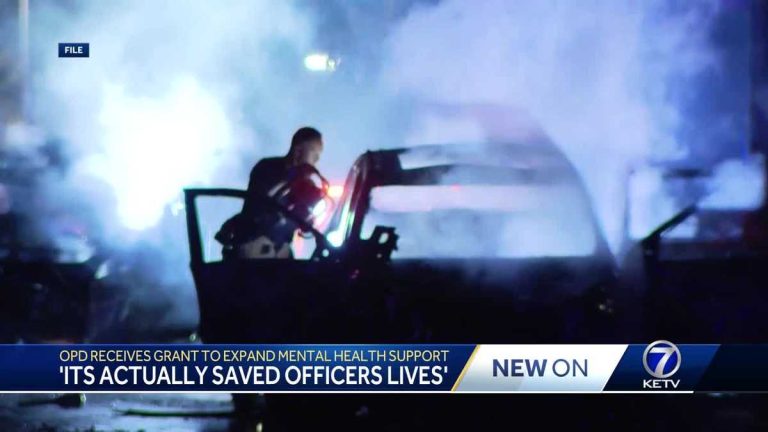The Omaha Police Department received a grant to expand support services for its officers. The department will now be able to send 250 staff members to counseling sessions. They partner with therapists from the First Responders Foundation. The grant is provided through the Law Enforcement Mental Health and Wellness Act program. Just two years ago, retired Omaha police officer Keith Thompson committed suicide. He left his family and colleagues stunned. Omaha Police Officers Association Vice President Dan Martin said it’s a wake-up call to other police officers. “We’re human, we have to take care of ourselves, everyone wants to make it seem like we’re robots and we’re not,” Martin said. According to Boston University, law enforcement officers are 54% more likely to commit suicide than the general public. Omaha Police Employee Resource Sgt. Mandee Kampbell shared her thoughts on why this is happening. “We deal with trauma, and it persists, and we have the means,” Kampbell said. She said scenes involving children can particularly impact responders. OPD responded to several events recently, including a violent crash at 10th Street and Douglas where three children were killed, a shooting among classmates at Northwest High School, and the accidental shooting of a 6-year-old child. years. “He spoke with other people present at the scene and they exchanged their views. “But we also have to take into account the seriousness of what we have just experienced,” Martin said. He said that the Omaha police have taken a proactive approach to mental health “Oftentimes you have to wait for the officer to ask for help. We offer it automatically if we know the agent has been involved in a critical issue. incident,” Martin said. The department’s peer support team also has about 100 staff members. “I think it’s actually saved officers’ lives,” Martin said. “It really helps us to help the community; “If we are broken or injured, we will have difficulty helping those who call 911.” For the fourth year, OPD received a grant from the Department of Justice’s COPS office. It will fund the services of a new specialist in peer support to lead the team for that, as I split my time with FMLA, in-service injuries and other things, so I led the peer support team, but that’s not. not my only goal,” said Kampbell. Mandatory confidential counseling sessions will also be extended to 250 officers. Previously, only the traffic, homicide, adult and child victims and medical examiners units attended the sessions. Peer support staff and uniformed patrol sergeants will now be included. “It helps reduce the stigma because they are mandatory,” Kampbell said. She said that although stigma within the department about mental health has decreased, the more it is talked about, the more officers will become open about it.
The Omaha Police Department received a grant to expand support services for its officers.
The department will now be able to send 250 staff members to counseling sessions. They partner with therapists from the First Responders Foundation.
The grant is provided through the Law Enforcement Mental Health and Wellness Act program.
Just two years ago, retired Omaha police officer Keith Thompson committed suicide.
He left his family and colleagues stunned.
Omaha Police Officers Association Vice President Dan Martin said it’s a reminder to other police officers.
“We’re human, we need to take care of ourselves, everyone wants to make it seem like we’re robots and we’re not,” Martin said.
According to Boston University, law enforcement officers are 54% more likely to commit suicide than the general public.
Omaha Police Employee Resource Sgt. Mandee Kampbell shared her thoughts on why this happened.
“We deal with trauma, and it persists, and we have the means,” Kampbell said.
She said scenes involving children can have a particularly big impact on responders.
OPD recently responded to several questions, including a violent accident on 10th and Douglaswhere three children were killed, a shooting between classmates at Northwest High school and accidental shooting of a 6 year old child.
“It’s difficult; I recently participated in a stress debriefing during a critical incident in which a child died,” Martin said.
He talked about it with other people who responded to the scene and they exchanged their views.
“But we also have to take into account the gravity of what we have just experienced,” Martin said.
He said Omaha police have taken a proactive approach to mental health.
“Oftentimes you have to wait until the officer requests help. We automatically offer it if we know the officer was involved in a critical incident,” Martin said.
The department’s peer support team also numbers around 100 people.
“I think it actually saved officers’ lives,” Martin said. “It really helps us help the community; if we’re broken or hurt, we’ll have a hard time helping those who call 911.”
For the fourth year now, OPD has received a grant through the COPS office of the Department of Justice.
It will fund the services of a new peer support specialist to lead the team.
“Having someone whose focus is solely on peer support so that they can monitor officer calls and their life experiences and have time solely for that, whereas I split my time with FMLA, the line-of-duty injuries and other things, so I led the peer support team, but that’s not my only focus,” Kampbell said.
It will also expand mandatory confidential counseling sessions to 250 officers.
Previously, only the traffic, homicide, adult and child victims and medical examiners units attended the sessions.
Peer support staff and uniformed patrol sergeants will now be included.
“It helps reduce the stigma because they are mandatory,” Kampbell said.
She said that although the stigma within the department regarding mental health has decreased, the more it is talked about, the more officers will become open about it.


